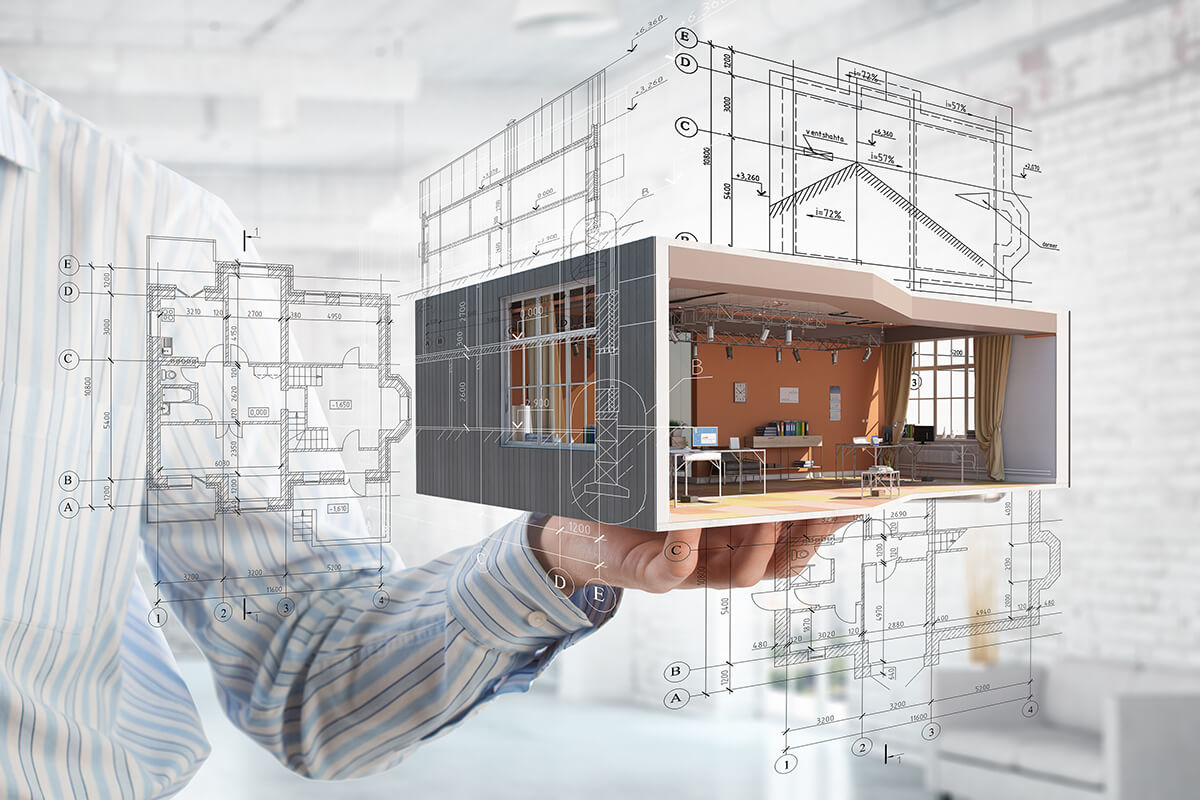You have all these ideas of how you want your home to appear but you’re not sure how to make it happen. An Architect can turn this into reality.
1. Your vision turns into reality with an Architect.
Extensive University training & experience provide the Architect with an abundance of ideas and techniques to bring your vision to life.
Recent advances in technology have armed Architects with a wide range of visualisation tools that assist greatly in communicating the Architect’s design intent to the Client.
3D computer modelling and photo realistic rendering bring projects to life early on in the design process. With Virtual Reality (VR) now becoming more accessible, Clients can actually experience walking around their project and perceive the spaces and views firsthand well before construction commences on site.
 To find out more about VR see our post Virtual Reality – A Game Changer for Architects and their Clients.
To find out more about VR see our post Virtual Reality – A Game Changer for Architects and their Clients.
2. Architects help you get the most for your budget.
As much as you’d like to include everything on your wish list, your budget may mean you need to compromise. The benefit of using an Architect is that they can help you to get the maximum “bang for buck”. They’ll be able to show you alternative selections that you may not be aware of or might not have considered.
Architects also develop relationships with many suppliers and can often secure discount pricing for their Clients not available to the general public.
3. An Architect saves you time.
It’s easy to spend hours of your time researching finishes or products. This is especially true if you are new to designing your home. While you may find what you are looking for quickly, conversely it could take you hours, days, weeks or even months of searching.
An Architect is exposed to a multitude of products and design features daily and can save you considerable time in recommending where to find products and how to get the best in quality and price.
4. Architects are adaptable.
The experience and knowledge Architects possess goes a long way to making the process simpler and the outcome better.
An experienced Architect will have the ability to design to different budgets and offer different design solutions or architectural styles tailored to meet your specific needs.
Every project is different and “cookie cutter “designs are not suited to all sites or Client’s needs.
Architects can also tailor their services to suit your specific needs, ranging from simple design guidance, through to a fully managed turnkey project delivery.

5. An Architect can design your home to be more sustainable
The cost of your home is not only quantified by your design and construction expenses. Ongoing household running costs are increasingly an important aspect often overlooked by new homeowners.
An Architect is trained to understand the impacts of building orientation and the importance of shading, natural lighting and ventilation in reducing the demand for electricity.
Architects can also recommend building materials that carry less embodied energy, are quicker to install, or require less ongoing maintenance.
6. Architects often think outside the square.
Clients often present Architects with their vision crudely drawn to demonstrate what they perceive as their definitive layout. They may have spent months labouring over their design before meeting with an Architect. Often the Architect can interpret the essence of the Client’s needs from these concept drawings and develop quite a different design approach that the Client may not have considered providing a better design solution. Architects are adept problem solvers.
7. By using an Architect, you’ll save money by avoiding any surprise costs.
An Architect can generally design whatever you want, however a crucial skill of any Architect is the ability to deliver your brief within the budget you set. Architects are not cost planners, there are other professions that provide those services.
An experienced Architect however will have a good understanding of approximate construction rates for different types of projects which can be used as a guide. Ultimately the cost will be determined by an estimator, so the more detailed information they have to price from, the more accurate the pricing. An Architect can provide comprehensive documentation, specifications and schedules to define the design intent and minimise the potential for unforeseen variations to arise during construction.

8. An Architect is your partner for the entirety of the project.
An Architect’s service is not confined to producing a design and then setting you on your way to navigate the construction process on your own. Whilst some Clients may be happy to undertake this role themselves, many find this just as daunting as the design process.
Architects have the skills to manage this process on your behalf to ensure the design intent is achieved on time and within budget.
From recommendations on suitable builders to tender the project, overseeing the tender process, assisting in selecting a suitable form of building contract, administering the contract, inspecting the works during construction, these are all important services that can deliver a “turn key” project. From site selection to handing over the keys, the Architect is your partner on what can otherwise be a very stressful and lonely journey.

9. The Architect is only a small cost in the overall budget.
Whilst other professions like medicine, accounting and law offer what many perceive to be essential services, it is unfortunate that Architects are often considered an expensive luxury only engaged by the very wealthy.
Given that owning a home is one of the biggest financial investments most of us will make in our lifetime, engaging an Architect to maximise the potential value of your property should be considered mandatory.
Whether it’s a simple renovation to an existing property, or designing a new bespoke building, architectural fees are only a small percentage of the total development cost.
These fees are often offset by savings made in construction costs due to careful material selections & specifications, comprehensive documentation minimising variations, or increased completed property value due to high quality design.
10. An Architect is a highly skilled professional.
Architecture is a highly skilled profession requiring 5-6 years of university study to gain a degree. A further two years of post-graduate work experience are required before sitting registration exams entitling the graduate to use the title Architect. To maintain this registration, the Architect must complete mandatory continued professional development courses every year. This is essential to keep abreast of the rapid advances in new building materials, technologies, construction techniques and the associated changes to compliance legislation and building regulations.
All of these skills and experience ensure the entire design process is well managed and the best outcome is achieved for you, the Client.
